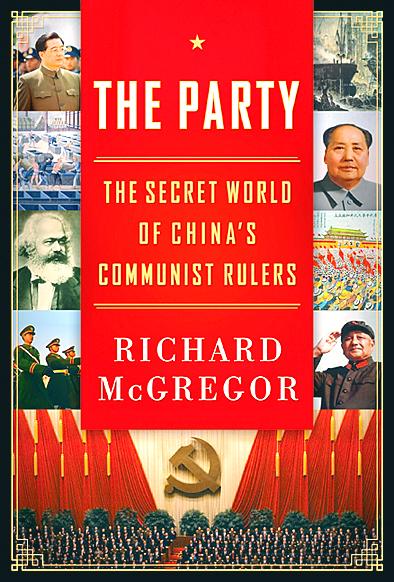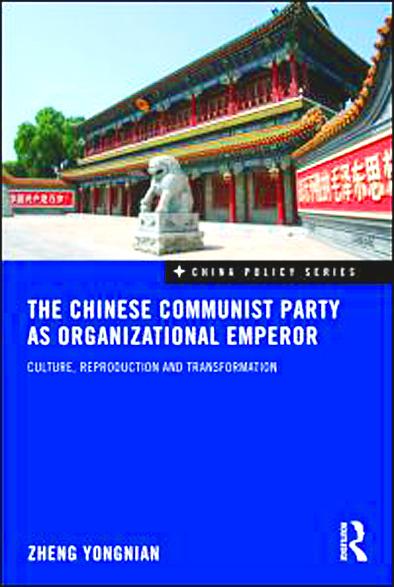The claim that the Chinese Communist Party (CCP) is misunderstood by outsiders has become something of a cliche recently, conferring upon the almost 80-year-old political organization an aura of impenetrability. This dearth of knowledge has slowly been remedied, however, with the publication in recent years of solid studies on the party’s philosophy, modus operandi and ability to defy the odds by remaining in power.
Two new books, The Party, by former Financial Times Beijing bureau chief Richard McGregor, and The Chinese Communist Party as Organizational Emperor, by National University of Singapore professor Zheng Yongnian (鄭永年), make important new contributions to our understanding of this most enigmatic of political parties.
Though targeting very different audiences (McGregor’s style is journalistic, whereas Zheng’s is overly academic), the two works reach similar conclusions as to the CCP’s strategies, conclusions that had already been proposed in David Shambaugh’s China’s Communist Party: Atrophy and Adaptation (reviewed in the Taipei Times on May 11, 2008). The party brooks no organized opposition (what Zheng refers to as a counter-hegemony), does not tolerate the formation of political parties capable of challenging its hold on power, opposes the complete divorcing of party from state, and does not encourage the evolution of democracy as it is understood elsewhere.

This said, the CCP is no monolith, as the two books clearly demonstrate, nor has it failed to comprehend the tremendous challenges that have emerged as the country modernizes and embraces capitalism. The party’s decision to allow capitalists to become CCP members, which Zheng describes as an epochal development in the politics of the past century, is a case in point.
This adaptability, McGregor and Zheng argue, has also had effects on the state’s willingness to use force to repress dissent. Though, in the extreme, the security apparatus will not hesitate to violently quell dissent, the preferred means of oppression have become more refined and subtle, relying instead on intimidation and, with increasing success, co-optation.
Intra-party democracy, or the “accommodation of democratic elements,” which Zheng looks at in more detail than McGregor, is also a product of the CCP’s adaptability and, along with economic growth, probably the key to its survival.

Both authors point to corruption, particularly among the upper ranks of the CCP, as well as unequal distribution of wealth, as posing the greatest risks to state stability and by extension to the party. McGregor and Zheng cite the demise of the Shanghai clique in the mid-1990s and the use of allegations of corruption to bring top officials to heel as examples of how the war on corruption has become intrinsic to factional politics. McGregor’s description of the party apparatus in charge of investigating corruption (and the system that enables officials at the very top to avoid scrutiny) makes for particularly entertaining reading.
While there isn’t anything fundamentally new about the subjects addressed by the two authors, their exploration of the various CCP departments, and how they intersect and interact with the state apparatus, is very helpful, though Zheng’s, which can become so detailed as to name the professors teaching specific classes in the Central Party School, will likely appeal to a very confined group of experts on China.
An interesting point where the two works depart, and what makes them complementary, in a way, is in Zheng’s attempt to portray the CCP not so much as an oddity, but as the product of the society in which it emerged — hence the “reproduction” in the title. Throughout his book, Zheng makes the case that the CCP’s approach to power is contingent on historical continuity and draws from practices implemented back when the country was ruled by emperors. Though this argument could be exploited to make a case against democratization, it nevertheless makes a valid contribution to our understanding of the party’s resistance to Western-style democracy and the ostensible lack of widespread calls for such democracy among ordinary Chinese. Interestingly, we learn that Sun Yat-sen (孫逸仙), the father of the Republic of China, was also opposed to the creation of public associations outside his party and proposed the idea of “partifying the masses” as an alternative to independent social organizations.
Ironically, as Zheng points out, historical continuity, i.e., the reproduction of the organizational emperorship, is also the main driver behind the CCP’s need to adapt and embrace Marxism’s nemeses, such as capitalism and democratic elements, as Chinese history is rife with examples of rigid systems being overthrown by a counter-hegemonic force. As such, to avoid a similar fate, the CCP has no choice but to open up, which in turn empowers other social classes that must be kept in check lest they overturn the system. “As long as the CCP is able to reproduce itself as an organizational emperor,” Zheng concludes, “it is unlikely that China will develop into a Western style of democracy.”
These two works come highly recommended. McGregor’s is easily devoured in a few sessions, while Zheng’s prose, heavy in political jargon and at times repetitive, undermines the book’s readability, and as a result its contribution to our understanding of the CCP is unlikely to reach a mass audience.
For all his nuanced perspective on the Chinese political system, Zheng also makes an incomprehensible slip toward the end, claiming, after indirectly laudatory passages about the emergence of democracy in Taiwan, that democratization characterized by the emergence of a multiparty system in Taiwan has not enabled the country to improve living standards as effectively as China, and led to corruption, “social decay” and “economic chaos.” Coming as it does in the conclusion of his book, this hyperbolic remark hints at a bias against democracy that raises all kinds of unanswered questions about the book’s premise.

Oct. 21 to Oct. 27 Sanbanqiao Cemetery (三板橋) was once reserved for prominent Japanese residents of Taipei, including former governor-general Motojiro Akashi, who died in Japan in 1919 but requested to be buried in Taiwan. Akashi may have reconsidered his decision if he had known that by the 1980s, his grave had been overrun by the city’s largest illegal settlement, which contained more than 1,000 households and a bustling market with around 170 stalls. Fans of Taiwan New Cinema would recognize the slum, as it was featured in several of director Wan Jen’s (萬仁) films about Taipei’s disadvantaged, including The Sandwich

“Wish You Luck is not just a culinary experience, it’s a continuation of our cultural tradition,” says James Vuong (王豪豐), owner of the Daan District (大安) Hong Kong diner. On every corner of Kowloon, diners pack shoulder-to-shoulder over strong brews of Hong-Kong-style milk tea, chowing down on French Toast and Cantonese noodles. Hong Kong’s ubiquitous diner-style teahouses, known as chachaanteng (茶餐廳), have been a cultural staple of the city since the 1950s. “They play an essential role in the daily lives of Hongkongers,” says Vuong. Wish You Luck (祝您行運) offers that same vibrant melting pot of culture and cuisine. In

Much noise has been made lately on X (Twitter), where posters both famed and not have contended that Taiwan is stupid for eliminating nuclear power, which, the comments imply, is necessary to provide the nation with power in the event of a blockade. This widely circulated claim, typically made by nuclear power proponents, is rank nonsense. In 2021, Ian Easton, an expert on Taiwan’s defenses and the plans of the People’s Liberation Army (PLA) to break them, discussed the targeting of nuclear power plants in wartime (“Ian Easton On Taiwan: Are Taiwan’s nuclear plants safe from Beijing?”, April 12, 2021). The

Artificial intelligence could help reduce some of the most contentious culture war divisions through a mediation process, researchers say. Experts say a system that can create group statements that reflect majority and minority views is able to help people find common ground. Chris Summerfield, a co-author of the research from the University of Oxford, who worked at Google DeepMind at the time the study was conducted, said the AI tool could have multiple purposes. “What I would like to see it used for is to give political leaders ... a better sense of what people ... really think,” he said, noting surveys gave